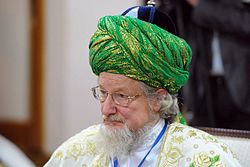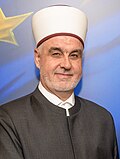| State | Incumbent | Status | Term |
|---|
| Albania | Bujar Spahiu  (1976 – ) [6] (1976 – ) [6] | Appointed Chairman of the Muslim Community of Albania (KMSH) by the Muslim Community of Albania | March 2019 |
| Australia | Ibrahim Abu Mohamed ( – ) | Appointed Grand Mufti of Australia by the Australian National Imams Council | September 2016 |
| Bosnia and Herzegovina | Husein Kavazović (3 July 1964 – ) | Appointed Grand Mufti of Bosnia and Herzegovina by the Islamic Community of Bosnia and Herzegovina | September 2012 |
| Brunei | Abdul Aziz Juned (22 December 1941 – ) | Appointed Grand Mufti Brunei by the Sultan of Brunei, Hassanal Bolkiah | 1 September 1994 |
| Bulgaria | Mustafa Hadzhi (31 March 1962 – ) | Appointed Chief Mufti of Bulgaria by the Supreme Muslim Council | 1997 – 2005 (first term)
2005 – |
| Canada | Syed Soharwardy (1955 – ) | Chairman of the Islamic Supreme Council of Canada (Grand Mufti of Canada) | 2000 |
| Caucasus region | Salman Musayev  (26 August 1949 – ) (26 August 1949 – ) | Mufti of the Caucasus by the Caucasus Muslims Council  | 1980 – 1992 (first post)
1992 – |
| China | Xilalunding Chen Guangyuan | Chairman of the Islamic Association of China | November 2016 |
| Egypt | Shawki Allam (12 August 1961 – ) | Appointed Grand Mufti of Egypt by the Council of Senior Scholars of Al-Azhar and approved by the President of Egypt, Mohamed Morsi | February 2013 |
| Ghana | Osman Nuhu Sharubutu (23 April 1919 – ) | National Chief Imam of Ghana (De facto) | 1993 |
| Guinea | El Hadj Mamadou Saliou Camara ( – ) | Grand Imam of Guinea (De facto) | |
| India | Sheikh Abubakr Ahmad (19 October 19 2019) | Appointed Grand Mufti of India by the Sunni Muslims of India | 2019 – |
| Iraq | Mahdi al-Sumayda'i (1 July 1955 – ) | Grand Mufti of the Iraqi Sunnis (de facto) | February 2014 |
| Japan | Yahya Toshio Endo [7] | Chairman of the Japan Muslim Association | 2021 |
| Jordan | Abdul Karim Khasawneh (1944 – ) | Appointed Grand Mufti of the Kingdom of Jordan by the Cabinet of Jordan and Abdul Hafez Rabtah as Chief Islamic Justice of the Kingdom of Jordan | 11 November 2019 |
| Kazakhstan | Nauryzbay Kazhy Taganuly ( – ) | Appointed Supreme Mufti of Kazakhstan by the Spiritual Administration of the Muslims of Kazakhstan as per nomination of former Supreme Mufti, Serikbai Kazhy Oraz | 7 February 2020 |
| Kosovo | Naim Ternava  (7 January 1961 – ) (7 January 1961 – ) | Appointed Grand Mufti of Kosovo by the Islamic Community of Kosova | October 2003 |
| Kyrgyzstan | Maksatbek Toktomushev  (9 August 1973 – ) (9 August 1973 – ) | Appointed Mufti of Kyrgyzstan | 2014 |
| Lebanon | Abdul Latif Derian (3 April 1953 – ) | Appointed Grand Mufti of Lebanon by the Higher Islamic Council | 10 August 2014 |
| Libya | Sadiq Al-Ghariani (8 December 1942 – ) | Appointed Grand Mufti of Libya by the National Transitional Council | May 2011 |
| Lithuania | ( – ) | Grand Mufti of Lithuania (De facto) | |
| Macedonia | Shaqir Fetahu | Reis-ul-ulema of the Islamic Religious Community of Macedonia | 2020 |
| Malaysia | Ahmad Fauwaz Fadzil  (12 September 1969 – ) [8] (12 September 1969 – ) [8] | Mufti of the Federal Territories (Website: muftiwp.gov.my) | 16 May 2020 |
| Dato Hj Yahya bin Ahmad | Mufti of Johor (Website: mufti.johor.gov.my) | 13 November 2018 |
| Syeikh Fadzil Awang [9] [10] | Mufti of Kedah (Website: mufti.kedah.gov.my) | 20 July 2017 |
| Mohamad Shukri Mohamad [11] | Mufti of Kelantan (Website: muftikelantan.gov.my) | 1 January 2008 |
| Abdul Halim Tawil [12] | Mufti of Malacca (Website: muftimelaka.gov.my) | |
| Faudzinaim Badaruddin [13] | Mufti of Negeri Sembilan (Website: muftins.gov.my) | 4 October 2023 |
| Asmadi Mohamed Naim [14] | Mufti of Pahang (Website: mufti.pahang.gov.my) | 1 April 2024 |
| Mohd Sukki Othman Noor [15] | Mufti of Penang (Website: mufti.penang.gov.my) | 1 July 2024 |
| Wan Zahidi Wan Teh [16] | Mufti of Perak (Website: mufti.perak.gov.my) | 17 June 2022 |
| Mohd Asri Zainul Abidin (1 January 1971 – ) [17] | Mufti of Perlis (Website: mufti.perlis.gov.my) | 2 February 2015 |
| Bungsu Aziz Jaafar [18] | Mufti of Sabah (Website: mufti.sabah.gov.my) | 10 August 2012 |
| Kipli Yassin [19] | Mufti of Sarawak (Website: muftinegeri.sarawak.gov.my) | |
| Anhar Opir [20] | Mufti of Selangor (Website: muftiselangor.gov.my) | 29 July 2022 |
| Sabri Haron [21] | Mufti of Terengganu (Website: mufti.terengganu.gov.my) | 12 April 2021 |
| Mali | Chérif Ousmane Madani Haïdara | Chairman of the High Islamic Council of Mali | April 2019 |
| Mauritania | Ahmed Ould Murabit [22] | Grand Mufti of Mauritania | |
| Montenegro | Rifat Fejzić  ( – ) ( – ) | Reis-ul-ulema of the Islamic Community of Montenegro | |
| New Zealand | ( – ) [23] | Appointed Grand Mufti of New Zealand | |
| Nigeria | Ibrahim Ibn Saleh al-Hussaini (1938 – ) | Appointed Grand Mufti of Nigeria by the Supreme Council for Fatwa and Islamic Affairs in Nigeria | |
| Oman | Ahmed bin Hamad al-Khalili (27 July 1942 – ) | Appointed Grand Mufti of the Sultanate of Oman by the Sultan of Oman, Qaboos bin Said | 1975 |
| Pakistan | Munib ur-Rahman | Grand Mufti of the Barelvi school in Pakistan | |
| Taqi Usmani | Grand Mufti of the Deobandi school in Pakistan | |
| Palestine | Muhammad Ahmad Hussein (10 March 1950 – ) | Appointed Grand Mufti of Jerusalem by the President of the Palestinian National Authority, Mahmoud Abbas | July 2006 |
| Poland | Tomasz Miśkiewicz (9 July 1977 – ) | Appointed Mufti of the Republic of Poland by the Muslim Religious Union in the Republic of Poland | 2004 |
| Romania | Murat Yusuf (18 August 1977 – ) (Murād Yūsuf) | Grand Mufti of Romania | 2005 |
| Russia | Talgat Tadzhuddin (12 October 1948 – ) | Appointed Grand Mufti of Russia by the Central Spiritual Administration of the Muslims of Russia  | 1992 |
| Rawil Ğaynetdin (25 August 1959 – ) | Appointed Grand Mufti of Russia by the Spiritual Administration of the Muslims of Russian Federation  | 2014 |
| Saudi Arabia | Salih al‑Fawzan (1935 – ) | Appointed Grand Mufti of Saudi Arabia by the King of Saudi Arabia, Salman of Saudi Arabia | 22 October 2025 |
| Serbia | Sead Nasufović (22 June 1979 – ) [24] [25] | Appointed Mufti of Serbia by the Islamic Community of Serbia | July 2016 |
| Singapore | Nazirudin Mohd Nasir [26] [27] [28] | Appointed Mufti of the Republic of Singapore by the Majlis Ugama Islam Singapura, the statutory board of Ministry of Culture, Community and Youth | 1 March 2020 |
| South Africa | Mufti Mohamed Akbar Hazarvi [29] | Appointed Mufti by the Sunni Ulama Council, Sunni Ulama Cape and Cape Town Ulama Board | 20 June 2000- |
| South Korea | Mufti Muhammad Abdul Wahhab Zahid Al-Haq [30] [31] | Elected by the Muslim imams in Korea, and endorsed by the Korea Muslim Federation | |
| Syria | Osama al-Rifai (b. 1944) | Grand Mufti of Syria appointed by the Syrian opposition | November 2021 [32] |
| Tunisia | Othman Battikh (17 April 1941 – 25 October 2022) | Appointed Grand Mufti of Tunisia by the President of Tunisia, Zine El Abidine Ben Ali in 2008 and Beji Caid Essebsi in 2016 | 2008 – 5 January 2016 (resigned for haj pilgrimage in 2016)
12 January 2016 – (reappointed by the president after one week) |
| Turkey | Safi Arpaguş (b. 1967) | Appointed President of Directorate of Religious Affairs by the President of Turkey, Recep Tayyip Erdoğan, acting as Grand Mufti of the country. | 18 September 2025 |
| United Arab Emirates | ( – ) | Appointed Grand Mufti of Dubai by Islamic Affairs and Charitable Activities Department | |
| United States | ( – ) | Chairman of the Islamic Supreme Council of America (Grand Mufti of the United States) | |
| Uzbekistan | Nuriddin Xoliqnazarov (25 June 1968 – ) | Grand Mufti of Uzbekistan | 19 October 2021 |
| Zimbabwe | Ismail ibn Musa Menk (b. 1975) [33] | Grand Mufti of Zimbabwe |








